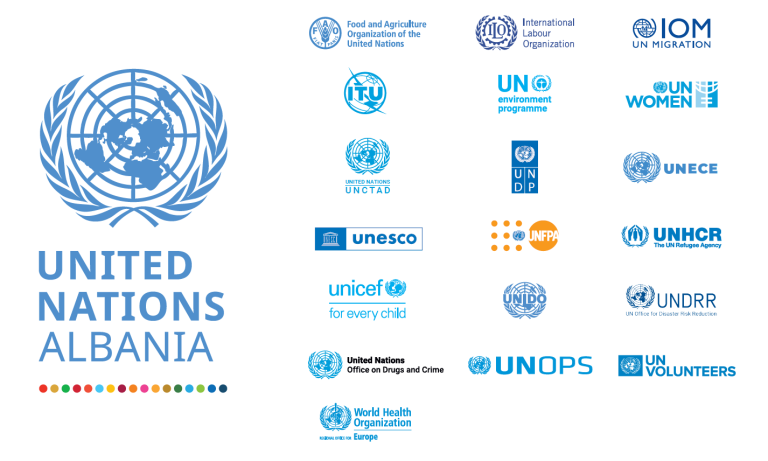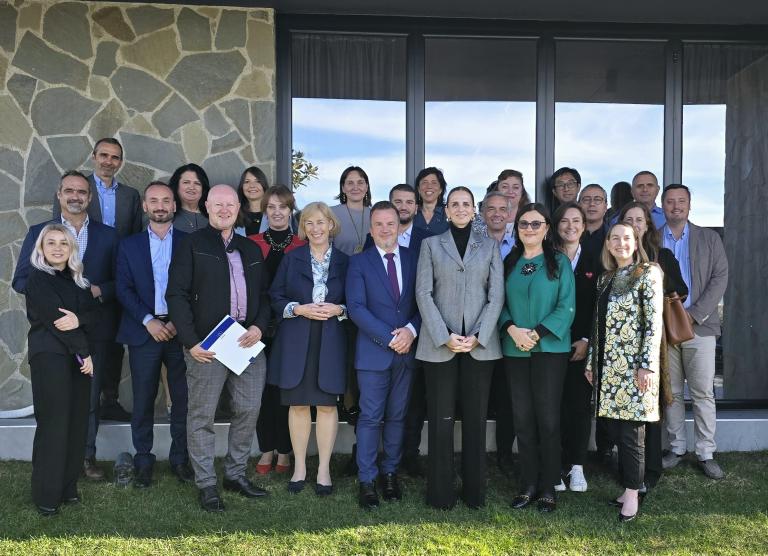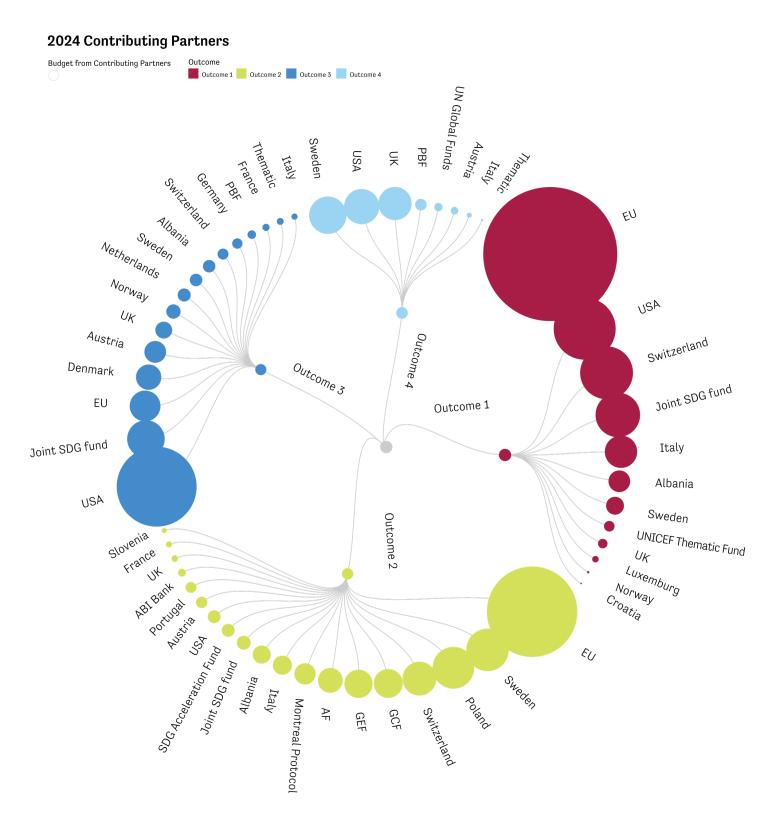In 2024, the UN in Albania, through 19 agencies, implemented the third year of the UN Sustainable Development Cooperation Framework (UNSDCF) 2022–2026, delivering USD 68 million.
Through strategic collaborations with government institutions, international partners, the private sector, civil society organizations (CSOs) and academia, the UN played a critical role in advancing Albania's sustainable development agenda. These partnerships have not only supported the country’s EU accession priorities but also strengthened efforts in key areas such as human capital development, economic growth, climate resilience, governance and inclusion. The partnership of the EU, World Bank and UN under the UN–EU Roadmap framework led to the development of a strategic paper on human capital, presented at EU House and at a meeting of the Donor Technical Secretariat, which promotes coordinated actions to align Albania's development objectives with EU accession and the SDGs.

Moreover, the United Nations Country Team (UNCT) continued to foster robust and structured dialogues with key international partners, including the EU, the governments of Switzerland, Sweden, Italy and the United Kingdom (UK), and other key partners. These regular exchanges provided a crucial platform for aligning priorities, sharing updates and advancing common goals agenda. Focusing primarily on UN support for Albania’s EU integration process, this includes active engagement in Albania’s EU screening process, supporting negotiation frameworks and assisting in the approximation of laws and policies with EU standards.
In addition to the EU integration, strategic partners discussions have centred around Albania's broader development priorities, including economic development, governance reforms and environmental sustainability. The UN has been able to play a key role in advocating for development assistance that aligns with both national needs and international standards, ensuring that cross-cutting issues such as human rights, gender equality (GE) and climate change are integrated into all aspects of development programming.

The UN worked with the non-governmental organization (NGO) Human Development Promotion Centre and supported the government in drafting documents in preparation for Albania’s first Integrated National Financing Framework (INFF), including the Development Finance Assessment, the roadmap towards the INFF Financing Strategy and, together with the United Nations Development Programme (UNDP), SDG Finance support and an SDG Investor Map for Albania, all launched in 2024. These efforts are crucial for aligning national development finance with the SDGs. The UN also supported the State Agency for Strategic Programming and Aid Coordination (SASPAC) in the development of a Roadmap for achieving the SDGs in Albania
This collaborative approach has resulted in significant achievements, such as prioritizing youth engagement and employment through impactful initiatives implemented in 2024 that reached 1,500 youth not in education, employment or training (NEET) across three municipalities. The Upshift programme further empowered youth to implement innovative climate initiatives, while more than 260 young people contributed to U-Report polls that shaped discussions at the Summit of the Future. Additionally, awareness campaigns promoted biodiversity and sustainable livelihoods, encouraging youth-led action on both local and global challenges.
In 2024, collaboration with the private sector reached new heights, with four new companies joining the UN Global Compact, while the number of signatories of private entities adhering to the Women’s Empowerment Principles reached 75 within the reporting year. The SDG Pioneers Awards engaged 67 businesses, recognizing 15 of them for outstanding contributions across five categories, while efforts to promote family-friendly and inclusive work environments led to four additional companies (increasing the total to 13) adopting progressive policies. Through the UN Free & Equal campaign, workshops and training sessions encouraged businesses to adopt anti-discrimination standards, fostering more inclusive workplaces.

Collaboration with academia also advanced, with the UN in partnership with Epoka University exploring SDG awareness within higher education institutions. Findings revealed that 85 per cent of respondents considered the SDGs critical for a sustainable future, underscoring the importance of integrating SDGs into university curricula and fostering community and business engagement. The UN’s commitment to creating a collaborative ecosystem in Albania is evident in the transformative results achieved across economic, social and environmental dimensions, reinforcing the importance of partnerships in advancing Albania’s development and the 2030 Agenda.
Lastly, in 2024, the Resident Coordinator's Office (RCO) in Albania was supported by the United Nations Volunteers programme, which provided four skilled and dedicated online volunteers who played a key role in facilitating the work of the Resident Coordinator (RC) and offering valuable assistance across a range of tasks, including data analysis, mapping, programme design and other crucial functions.
Looking ahead to 2025, the UNCT in Albania plans to further strengthen its partnerships, scaling up collaboration with existing partners and seeking to expand engagement with new partners during the formulation of the new UN–Government of Albania Cooperation Framework for 2027–2031. This will involve close consultations with all partners, ensuring that the next phase of support reflects evolving priorities and challenges, while also building on the successes of the past few years.

